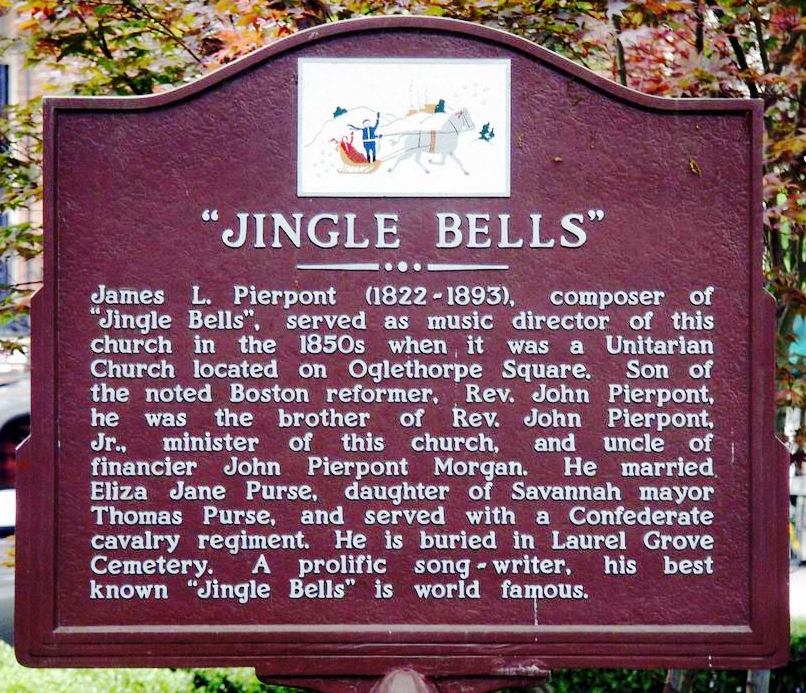A Sleigh Ride in Georgia?
At 19 High Street in Medford, Massachusetts, a plaque commemorates the spot where James Lord Pierpont supposedly wrote the popular holiday song, inspired by sleigh races on Salem Street, while sitting in a tavern in 1850. Contradicting this, Georgians insist that Pierpont wrote the jaunty winter anthem in that city, in late 1857, and led the first “Jingle Bells” singalong in a local Savannah church where his brother was pastor. The song was copyrighted with the name “One Horse Open Sleigh” in September 1857. However by that date Pierpont was the organist and music director of the Unitarian Church in Savannah, Georgia, where his brother, Rev. John Pierpont Jr. served as Minister. Is it possible that the song was written in Savannah? We do know that Pierpont could not have written “Jingle Bells” in a Medford tavern in 1850, because in 1850, he was in California trying in vain to cash in on the Gold Rush.
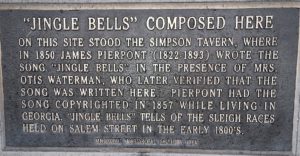
A plaque marks the spot in Medford, Mass. where Jingle Bells was composed by James Pierpont. (Medford Historical Society)
James Pierpont was born in 1822 in Massachusetts, the son of an ardent abolitionist. Music would’ve been an important part of James Pierpont’s home life as a minister’s son, and he probably picked up a lot of his early training just from singing and playing within his own family. At age 14, James ran away from home and joined the crew of a commercial whaling vessel. Working his way into the U.S. Navy, Pierpont served as a seaman until he reached the age of 21. Pierpont is also said to have prospected in California during the Gold Rush of 1849, and during this period his name is shown on the rolls of a music committee belonging to a Unitarian church based in San Francisco. Another interesting fact about him is that he is the uncle of J.P. Morgan.
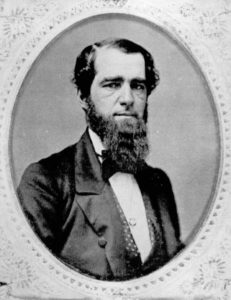
James Lord Pierpont was an American songwriter best known for writing and composing Jingle Bells in 1857, originally entitled “The One Horse Open Sleigh”.
James married Millicent Cowee, in the late 1840s, and they settled in Medford, where they had three children. In 1849, Pierpont left his wife and traveled out west. He was not successful out there and soon returned home. Millicent passed away in 1856, and Pierpont quickly remarried and joined his brother in Savannah, Ga. He became the organ and music director at his brother’s church, and gave singing and organ lessons to support himself. In August 1857, James married Eliza Jane Purse, daughter of Savannah’s mayor, Thomas Purse. She soon gave birth to the first of their children, Lillie. Pierpont’s children by his first marriage remained in Massachusetts with their grandfather. By 1859, the Unitarian Church in Savannah had closed because of its abolitionist position, which was unpopular in the South and Pierpont’s brother Rev. John Pierpont, Jr. returned to the North.
James remained in Savannah and at the beginning of the Civil War joined the Fifth Georgia Cavalry of the Confederate States. His service records indicate that he served as a company clerk. He also wrote music for the Confederacy including “Our Battle Flag”, “Strike for the South” and “We Conquer or Die”. After the war, Pierpont moved his family to Valdosta, Georgia where he taught music. In 1869, the family moved to Quitman, Georgia where James was the organist in the Presbyterian Church. Pierpont spent his final days in Winter Haven, Florida, where he died on August 5, 1893. At his request, he was buried in Laurel Grove Cemetery in Savannah next to his brother-in-law Thomas Purse who had been killed in the first battle of Bull Run. He died without making big money from ‘Jingle Bells’, and ended his days teaching piano to make ends meet. Now the song is an absolute classic of popular music and would have made him a multi-millionaire.
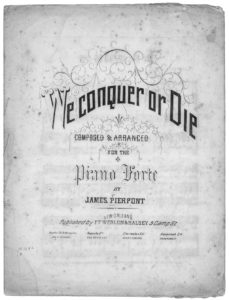
“We Conquer, or Die!” sheet music. (Credit: Library of Congress)
Today, “Jingle Bells” is one of the most recognizable American melodies and often associated with a Currier & Ives image of pastoral Christmases past. It has been recorded thousands of times—by everyone from the Beatles to Arthur Fiedler and the Boston Pops, and from Luciano Pavarotti to the Partridge Family to Pearl Jam. Although the song has no original connection to Christmas, it became associated with Christmas music. “Jingle Bells” became one of the most performed secular holiday songs ever written, not only in the United States, but also around the world.
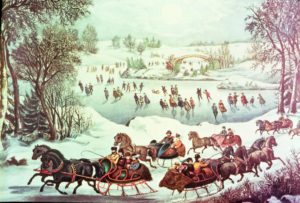
‘Central Park in Winter’ is a painting by Currier and Ives





